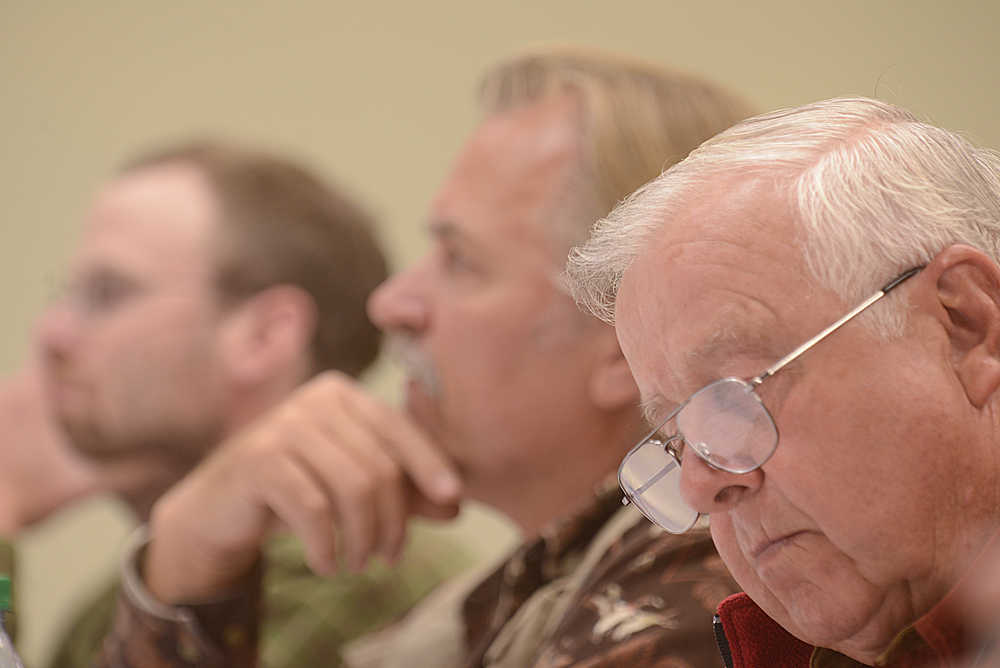Maw under investigation over residency
Published 7:15 am Wednesday, February 25, 2015
Gov. Bill Walker’s shakeup of the Alaska Board of Fisheries is off to a rough start.
Montana Fish, Wildlife, and Parks is currently investigating Roland Maw — nominated by Walker to a seat on the board to replace former chair Karl Johnstone — over holding resident licenses in Montana while drawing the benefits of Alaska residency, including Alaska Permanent Fund dividends and resident fish and game licenses.
Alaska Department of Fish and Game communications coordinator Candice Bressler on Tuesday said the department will provide Alaska State Troopers with certified copies of Maw’s Alaska licensure. The Montana department has not contacted Fish and Game, but has confirmed it is cooperating with the Alaska State Troopers.
Alaska State Trooper information officer Megan Peters said the department cannot confirm the subject of an ongoing investigation until charges are filed. Alaska law prohibits anyone from collecting a PFD if they are also drawing residency benefits in another state.
When asked for records of Maw’s licensing history, Montana Fish, Wildlife, and Parks assistant chief of enforcement Mike Korn said he could not provide any information, as the former executive director of the United Cook Inlet Drift Association is currently the principle in an investigation by that body.
According to public records, Maw has applied for an Alaska Permanent Fund dividend, or PFD, every year since 2002. The state can release applicants’ names but is prohibited from releasing whether an applicant received a dividend.
Between 1996 and 2003, Maw purchased resident class fishing, hunting, or combination licenses from the Alaska Department of Fish and Game.
In 2003, he qualified for and purchased a Permanent Identification Card, which is issued to Alaska senior residents for free hunting, fishing, and trapping. The card is void if the holder receives any benefits from another state, including resident licenses, voting rights, or tax breaks.
Walker said at a press conference on Feb. 24 that he has not yet had time to speak to Maw about the investigation, as he has been in Washington, D.C. Like Alaska and Montana law enforcement, the governor says he cannot comment on an ongoing investigation. Walker will now have two vacant Board of Fisheries seats to fill as Orville Huntington’s term is also expiring.
“I’ve seen what the media has written on it,” said Walker. “I haven’t really had any contact with him. Because it’s an investigation I don’t really weigh in. I don’t think it would be appropriate.”
Walker named Maw to the Alaska Board of Fisheries on Jan. 20, replacing Chairman Karl Johnstone, who resigned when Walker told him he wouldn’t be reappointed following public and gubernatorial scrutiny of the board’s actions at the Fish and Game commissioner nominee selection meeting on Jan. 14.
Maw had unexpectedly withdrawn his name from consideration for the board on Feb. 20 following scrutiny from the media and legislature, despite favorable public support and desirable credentials for Walker’s desired scientific fisheries management.
Maw’s resignation came just before his confirmation hearing’s conclusion. On Friday morning, the day his Senate confirmation hearing was scheduled to resume and aspects of his former employment brought before the Ethics Committee, Maw had a quiet conversation with someone in the governor’s office, according to Board and Commissions director Karen Gillis.
By the end of the conversation, Maw tendered a letter of withdrawal from confirmation consideration. The letter gave no reason for the withdrawal.
Maw accepted a call from the Journal on Feb. 20 confirming his withdrawal but declined to comment as to why he had withdrawn.
Gillis said she can’t remember an appointee having ever withdrawn his name from consideration, much less on such a tight timeline and with the broad public support Maw had in his favor. The office received more than 25 letters of support for Maw, and the public commentary at his confirmation hearing with the Senate Resource Committee was largely positive.
“The circumstance is unusual,” said Gillis. “We went into Friday (Feb. 20) thinking that things were going quite well (for Maw). He could’ve wrapped up his hearing on Monday (Feb. 23). He had a tremendous amount of support.”
Sen. Cathy Giessel, R-Anchorage, chaired Maw’s confirmation hearing with the Senate Resources Committee. She says the Montana investigation explains why Maw would drop from consideration, which seemed strange considering his public support.
“I can certainly see how that (investigation) would be the reason he withdrew his name,” said Giessel in a phone interview. “Before that, I had no idea why. I would say that out of 50 emails I received about (Maw), all but five were positive and expressed support.”
Some in the legislature said the votes in Juneau didn’t mirror the positivity the public expressed for Maw, and that the governor’s nomination was doomed from the beginning considering Maw’s commercial fishing past.
Sen. Bill Wielechowski, D-Anchorage, said the legislature, many of whom have heavy dipnetting and sportfishing constituencies, were nervous about altering the Board of Fisheries’ balance, which would have given commercial representatives a majority of the seven-member board had Maw been confirmed.
“I think Roland did the right thing by stepping down,” Wielechowski said. “I heard people say he would have been lucky to get 10 or 15 of the necessary 31 votes to confirm him.”
Maw’s residency issues are not uncommon in Alaska politics. In 2012, Sitka fishing guide Tom Ohaus was charged with illegally obtaining state fishing licenses due to accepting Massachusetts residency tax exemption benefits. He had been vying for the Alaska resident position on the International Pacific Halibut Commission.
The Alaska Democratic Party scoured tax breaks Sen. Dan Sullivan received for his Maryland home during the 2014 elections.
Johnstone himself faced scrutiny over his residency, as he spends much of his time in Prescott, Ariz., while serving on the Alaska Board of Fisheries from 2009-15.
Prior to the investigation being revealed, Maw’s critics had already leveled several charges they felt disqualified him from serving on the board.
His past commercial fishing advocacy while employed with the United Cook Inlet Drift Association, a small violation while a commercial fisherman, residency issues, and a book he contributed to while working in Canada were all brought up as ammunition by members of the legislature and Alaska media.
“You have been a very tenacious supporter of the Cook Inlet fish world, especially the commercial world,” said Alaska Sen. John Coghill, R-North Pole, to Maw at the opening of the hearing. “It seems to me that there are folks on the northern end who think ‘we’ll never be able to get this guy to think our way.’”
Questions came from Wielechowski and Stoltze, both of whom echoed Coghill’s concern over commercial interests. Wielechowski grilled Maw over two UCIDA 2011 Board of Fisheries proposals that would have limited Kenai and Kasilof river dipnetting and reduced the number of personal use Upper Cook Inlet sockeye from 25 per head of household to 10, maintaining the 10 for each additional household member.
Maw has tried to neutralize his UCIDA connections by denying he had a working role in the commercial group’s proposals and lawsuit. Maw responded with his mantra of “science first,” and replied that he had never been on the board of directors for the United Cook Inlet Drift Association and had no say in what kind of proposals or lawsuits it submitted, a position he would repeat throughout the hearing that Wielechowski later characterized as less than believable.
“I think it was pretty obvious to people that he was the executive director (of UCIDA),” said Wielechowski. “He was involved with their lawsuits and with their proposals.”
Sen. Bill Stoltze, R-Chugiak, questioned Maw over the UCIDA-filed lawsuit against the National Marine Fisheries Service in 2013 that alleged mismanagement of the Cook Inlet salmon fishery. Maw’s involvement with the lawsuit was to be heard before the Department of Law and Ethics Committee on Feb. 20, the same day as his confirmation continuation.
Maw says the suit has been mischaracterized as UCIDA asking for more federal oversight when in fact UCIDA was only suing to bring state management up to the existing fishery management plans in place under the national guidelines of the Magnuson-Stevens Act. The act was first passed in 1976 and governs all federal fisheries in the U.S.
“My understanding is that UCIDA was asking the federal government to help with managing some of the issues in the Cook Inlet,” Maw told the committee in response to a question from Stoltze.
Maw said the commercial organization was asking for assistance from the North Pacific Fishery Management Council, and that any perceived antagonism between the drift association and the state board did not reflect his personal agenda.
Maw said his name was only attached to it by virtue of his employment at UCIDA.
“I, Dr. Roland Maw, hereby declare as follows,” the lawsuit reads. “I am over 18 years of age and not a party to this action.”
Maw also faced scrutiny in the media. Alaska Dispatch News columnist Craig Medred published an article on Feb. 4 alleging that Maw lied about discovering a new species of fish, bull trout.
Maw categorically denied the charges of academic dishonesty and claims Medred’s column amounted to a personal attack. Maw claims he never claimed to have discovered bull trout and merely published that it was previously unrecognized as separate from Dolly Varden trout at the time in that part of Canada. Maw wrote a response to Medred’s column, but the Alaska Dispatch News did not publish it.
“I believe his attack on my integrity was malicious, and primarily intended to advance his personal campaign to discredit members of Alaska’s commercial fishing industry,” wrote Maw to the Senate Resources Committee.
DJ Summers can be reached at daniel.summers@alaskajournal.com.





